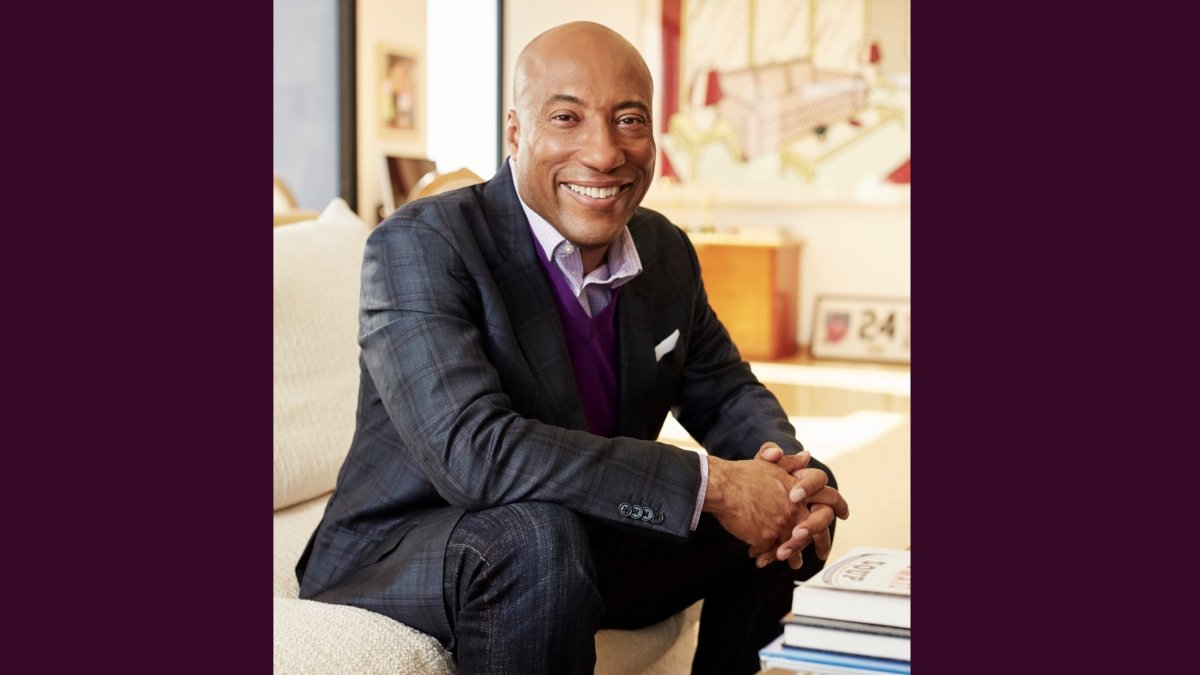[ad_1]
Media mogul Byron Allen has become a champion for change, fighting to break barriers with a multibillion-dollar lawsuit against Comcast and Charter Communications for not distributing his networks.
READ MORE: WATCH: The must-see message for Black America about Byron Allen’s multi-billion dollar lawsuit
The CEO of Entertainment Studios sat down with The Breakfast Club’s Charlamagne Tha God, Angela Yee and DJ Envy, for a captivating conversation about his rise from bankruptcy to billionaire status. During the conversation, he also pays homage to his mother who had him at 17-years old and raised him alone and whom he credits for paving the way for his foray into entertainment.
The Detroit native said it was his mom who first taught him the art of being persistent. This discipline is something that he has found to come in handy in his fight for equality in this industry. A child born during the Civil Rights era, his mother moved the family from Detroit to L.A. in 1968, during the tumultuous aftermath of Rev. Martin Luther King Jr.‘s death.
“I’ll be the first to say if the mothers succeed, so will the children,” Allen acknowledges. “And, if mothers fail, most likely, so will the children.”
Allen continued talking about his mother, Carolyn Folks and how her own venture into entertainment truly inspired him.
“…my mother was at UCLA and getting her master’s degree in cinema TV production, she went to NBC and said, ‘Can I get a job?’ and they said, ‘No.’,” Allen reflects. “And her persistence really paid off. She said she asked a very important question, and she asked a question that changed our lives. She asked, ‘Do you have an internship?’ And they said, ‘No.’ And then she went to the next question. ‘Will you start one with me?’ And they said ‘Yes.’.”
That type of tenacity Allen said was a “game-changer.” It set the wheels in motion to open doors for him, as his mother navigated her way through various jobs at NBC. Since childcare wasn’t an option back then, he was able to get a front-row seat to several rising stars who were about to take center stage.
“I would just watch Johnny Carson do The Tonight Show, and I watch Red Foxx do Sanford and Son… and Richard Pryor do his specials and Freddie Prinze do Chico and the Man. And, then I would go and watch an unknown sportscaster do the local news… Bryant Gumbel.”
READ MORE: Various civil rights organizations criticize Comcast move in discrimination case
Allen’s understanding of the power dynamics from behind the scenes, and his mother’s refusal to accept ‘no’ was the catalyst that helped him carve out a path to becoming a Hollywood executive who now owns the Weather Channel and theGrio. He admits, it was a rough road pitted with rejection, but his focus was laser sharp.
“I started my company from my dining room table in 1993, and I did a television special with a bunch of funny friends. I remember that.” Allen said.
“I called all 1,300 television stations and asked them to carry the show for free. And, on average, they all told me no about 50 times,” he admits.
“Literally, I sat [at] my dining room table from sunup to sundown and I got about 50,000 nos. After a year of doing that, I was able to squeeze out about 150 yeses. I got a station, a TV station in every market from New York to Waterloo Island. Right. And so that was my lineup.”
Allen said he poured lots of sweat equity into doing the work. And he did, “everything myself. It is the hardest thing I’ve ever done.”
READ MORE: Byron Allen acquires 11 television stations for $290 million
More poetic is that Allen rose to become a force in the entertainment industry that has shaken several major media conglomerates to the core.
Allen alleges the Comcast and Charter Communications networks are specifically in violation of the Civil Rights Act of 1866, which prohibits racial discrimination in contracting. He believes is broadening the divide for Blacks.
The Supreme Court has agreed to hear the $20 billion dollar case in November, and if Allen wins it would be a major victory for Black-owned companies and Black media.
In fact, the power of empowering our own and representation is one reason Allen says he bought theGrio.
“I felt it was important to buy theGrio, you know, to own our position in the marketplace and to really control our narrative. So, you know, it’s very important to me because when my children were born, I had a white guy say to me, it’s important that you have Black ownership.“
In terms of economic inclusion and empowerment, Allen believes there are lots of opportunities for other Black people to find the right investments that will ultimately lead more people to becoming members of the billionaire’s club.
“I want to make sure everybody understands how much money there is out there and it is there for you. That money is there for you and you can make all that and more, especially today,” said Allen.
“I mean, you look in America, this is the greatest financial system out there. We have over 20 trillion dollars in liquidity in our financial system and that money is just swirling, looking for a place to invest and looking for a place to get a safe return. That money’s available to you. That money is looking for you and there aren’t that many people who can actually invest it, protect it, return it with a return. So there’s plenty of capital, there’s no shortage of capital in America.”
The interview struck a chord with Charlamagne Tha God, who rated it as one of his top three conversations of the year. Allen has undeniably become a formidable voice in a space that has tried to silence him.
[ad_2]
Source link

